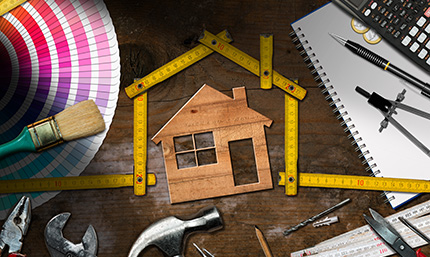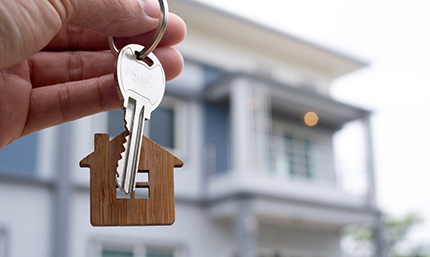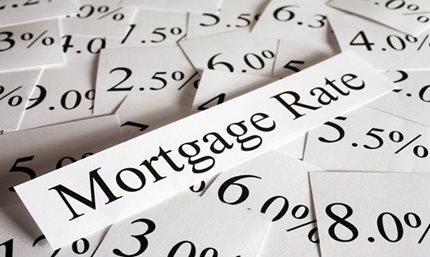News & Tips
Reduce the Stress of Home Buying with a Mortgage Loan Calculator

Whether you’re considering buying your first home or thinking of refinancing your current mortgage, home buying and financing can be a trying experience. It doesn’t have to be when you’re armed with information! A good place to start is with a mortgage loan calculator or refinancing calculator that can help you answer important questions such as just how much home you can afford or how much home loan payments will be. In this post, we’ll look at some of the factors that determine payment amounts, give you links to our handy Space Coast Credit Union (SCCU) calculators, and explain some of the costs that go along with mortgage lending.
Plan Your Home Financing with SCCU’s Mortgage Calculators
To find out which SCCU mortgage solution is right for your needs, our convenient mortgage estimator gives you several options, including rate and payment estimates.
Want to know how much home you can afford or whether refinancing your current mortgage is a smart move? Our wide range of calculators can help you get started on your financing plans:
- Fixed-rate mortgage loan calculator: Calculate the principal and interest for a fixed-rate loan.
- Adjustable-rate mortgage loan calculator: Find out how much the estimated payment and interest may be for a loan where the rate may increase to a specified rate cap.
- Refinance calculator: Find out if the amount you save in interest will exceed refinancing costs such as points, fees, and closing costs.
In addition, we have calculators that can help you answer these questions:
- How much home can I afford?
- Should I rent or buy?
- Which mortgage is better for me?
- How much will my closing costs be?
- Should I consolidate my loans?
If you have other questions about payment amounts, types of home loans for which you may qualify, or any other mortgage-related topic, please call our Express Mortgage Originators at one of these numbers on weekdays from 8:00 a.m. to 7:00 p.m. or on Saturdays from 9:00 a.m. to 5:00 p.m.:
- Brevard County: 321-752-2222
- Broward County: 954-704-5000
- Miami-Dade County: 305-882-5000
- All other areas: 800-447-7228
What to Know About Buying or Refinancing a Home
When you’re ready to buy or refinance, it’s essential to understand the main factors that can affect qualifying for a loan and the interest rate you may get. If you are a first-time homebuyer, you may want to spend some time getting familiar with the new-to-you world of mortgages as well—the Federal Trade Commission offers a good overview on its Homes & Mortgages web page.
The loan amount: Mortgage lenders will need to look at your total monthly income before taxes are deducted and your total monthly debt payments (such as credit card, student loan, and car payments) to determine the upper limit of how much you can afford for a mortgage loan.
The down payment amount: Most conventional loan programs require a 20% down payment. Other types of loans, such as VA and FHA loans, typically require much less. As you start to learn about the loans that may be available to you, be sure to find out the down payment requirements of each, then use our calculators to test how various down payment amounts will change your monthly principal and interest amount.
Note that with a good credit score and debt-to-income ratio, the more you have to put down, the better your chances of qualifying for a great mortgage rate.
Your financial position and history: To determine the loan type, amount, and term for which you may be eligible, lenders will assess your credit score, repayment history, assets and cash reserves, the location of the property, and more.
The loan term: Depending on which types of loans you qualify for, you may have a wide range of options when it comes to the term or length of the loan.
- A 30- or 15-year conventional fixed-rate mortgage will have a set payment amount that won’t change over the entire course of the loan, so you’ll always know how much to budget for your mortgage loan payment. Fixed-rate loans are often best if you plan to stay in your home for several years.
- An adjustable-rate mortgage (ARM) has interest rates and payment amounts that can decrease or increase over time. These loans typically have more flexible terms and start out at a lower initial interest rate and payment. An ARM may be a good choice if you plan to sell in a few years.
- Other types of loans, such as construction loans, jumbo home loans, condo loans, and those for Veterans (VA loans), may offer either fixed or adjustable rates and have varying loan terms.
One last note on this topic: Don’t forget to factor in closing costs when determining your home-buying budget! All lenders will have certain fees and charges associated with their various loans. Depending upon the lender and the type of loan, these costs can be considerable. At SCCU, we offer our members a No Closing Costs Mortgage option that can reduce the amount of cash needed at closing.
Understanding Mortgage Payments
Your total mortgage payment may consist of only principal and interest, or include those elements and several others. Here’s what can go into a mortgage loan payment:
Principal: The principal payment you make is simply your payment toward the total amount you borrowed. Although the total payment on a fixed-rate mortgage will never change, the amount of that payment that is applied to the principal does change as you pay off the loan. This is amortization, or how a home loan is paid down. At the beginning of the loan, you’re paying more in interest than in principal; this gradually shifts over time so that you’re paying more toward the principal toward the end of the loan.
Interest: This is the cost to borrow money from a lender, and it can have the most influence on your total monthly payment and the long-term costs of your loan. Mortgage interest rates often change in response to several economic factors, such as the stock market and inflation. Ask any lenders you’re considering to share their current interest rates on various types of loans, and also ask how or if a particular interest rate can be locked in. Use our mortgage estimators to see how different interest rates can affect your total payment amount as well as how much you will pay in total interest over time.
Insurance: Any time you borrow money to purchase a home, lenders will require that you maintain an insurance policy to protect their collateral in case of damage or loss. Some homeowners choose to pay their insurance premiums directly to the insurance company rather than have it included in their monthly mortgage payments. When your insurance premium is included in your loan payment, the amount you pay for insurance each month goes into an escrow account. The funds stay there until your annual insurance premium payment is due. In certain areas, you may also need a flood insurance policy and/or a wind insurance policy, so be sure to include those costs in your budget if necessary. Insurance premiums can go up or down yearly based on economic factors, claims, and more.
Private mortgage insurance: Usually referred to as PMI, this insurance policy protects lenders if the borrower defaults on the loan. PMI is required when you make a down payment of less than 20%, but it’s only required until your balance drops to 78%, at which time PMI can be canceled.
Property taxes: When your property taxes are included in your payment, the amount you pay for those taxes goes into an escrow account. The funds stay there until your annual property tax payment is due to your county, city, or district. This amount can increase if the tax rate rises or if your home is reassessed at a higher market value. Some lenders require that property taxes be part of your payment, while others give you the option to pay them directly to the taxing authority.
HOA fees: Although it won’t be part of the payment you make to your lender, homeowners association (HOA) fees are another cost to factor in when you’re shopping for a home. If you buy in a planned community, you’re likely to be responsible for paying these fees, which are collected to cover the costs of expenses such as upkeep on the community’s pools, landscaping in common areas, and more. These fees can be significant in upscale neighborhoods, so be sure to find out how much they will be.
Also, ask about the community’s history of special assessments, and whether any are being currently considered—if the fitness center needs a new roof or new plumbing in the coming months, you and your fellow homeowners may be facing a sizeable expense that wasn’t in the budget.
How to Have a Lower Mortgage Payment
While you can’t control every factor that affects your total monthly mortgage payment, you can make choices that help ensure you can comfortably afford it.
Opt for a longer loan term: A 30-year fixed-rate mortgage loan will have a lower monthly payment than a 15-year loan. Keep in mind, though, that while this will keep your monthly payment lower, it means you’ll be paying more in total interest charges over the full life of the mortgage loan.
Purchase a less expensive property: This is an obvious way to pay less principal and interest, of course, but buying a less expensive house can save you money in other ways. You won’t need to save as much money in order to have a 20% down payment (which saves you from having to pay PMI). You’ll also pay less in taxes and insurance. A less expensive home is usually a smaller home as well, so you’re likely to save on upkeep costs.
Find the lowest interest rate you can qualify for: As described in the above section, interest makes up the bulk of your monthly payment for the first several years, so the interest rate is important. Ask lenders for details on the various types of loans they offer that can help you get the lowest possible interest rate.
Make a larger down payment: It can be tempting to want to hold back some cash to make a few improvements in your new home or keep more cash on hand. If you can, however, put more down so that you can reduce the size of your loan and not be subject to the PMI requirement for down payments of less than 20%.
Tips for Refinancing Your Mortgage
A refinance calculator is particularly helpful when you’re wondering if you should refinance your existing mortgage loan. There are several reasons for paying off your current loan and replacing it with another one—here’s what to consider:
- Refinancing to get a lower interest rate can lower both your monthly payments and the total amount of interest you will pay over the loan’s full term.
- Switching from an adjustable-rate loan to a conventional fixed-rate mortgage is often a way to lower your interest rate, even if market rates haven’t dropped overall. This can be helpful for budgeting household finances as well since you’ll have a principal and interest payment that won’t ever change.
- Has your credit score improved? A higher score may qualify you for a lower mortgage interest rate.
- If you have sufficient equity built up in your home, a cash-out refinance may be right for you. Refinancing this way will result in a higher loan amount for your new loan but allows you to take cash out in the amount of extra money you borrowed.
We’re Here to Help
Being our Members’ Watchdog means we’re here to help you through every stage of the home buying and financing process to ensure you have the right financing for your needs now and in the future. Visit the Space Coast Credit Union Home Buying Center, where you can view current rates, start the pre-qualification process, or request a consultation with one of our experienced home loan associates.

























.jpg?width=430&height=257&ext=.jpg)




